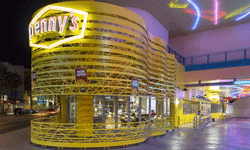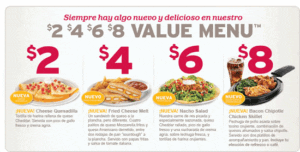By 2010, Denny Corp.’s same-store sales had been in a free fall for at least four years. The number of customers coming to its restaurants had been declining for 20 years. The company had withstood several bankruptcies and a nasty lawsuit. It was challenged by a ton of competition and the recent recession only aggravated the problems.
It was that year, 2010, that Denny’s hired Francis Allen as executive vice president, global brand strategy and chief marketing officer, to turn things around. There were some positive signs to build on: Denny’s consumer awareness held at 97%, and trial at 95%, but the problem was that most of that trial and experience had taken place in the past, customers just weren’t coming back. The entire mid-scale, family-dining category in general was in decline.
“We lost our brand positioning, our product relevance, and as we lost sales we put the price up to cover our guest check average and then we lost our value equation,” Allen said today at the ANA Brand Masters Conference.
She and her team began to recapture the latent affection she learned people had for Denny’s through a set of five principles:
The first was to understand who the customer was and what they wanted from the brand. Over a four-month period, 100 interviews were conducted with both heavy and light users of its restaurants, as well as franchisees. The brand even asked customers to write obituaries for Denny’s to get people to home in on specifics that endeared these customers to the brand. The finding revealed customers that cross all demographics and ethnicities, working class people who work hard and have a common set of “mid-western” values, including the importance of family. They are non-judgmental and were optimistic, even in the midst of the recession. These customers described Denny’s as a place where they felt comfortable enough to be themselves: a place to connect with family and friends and a place that’s always open. In essence they were describing the quintessential all-American diner.
But based on that knowledge, Denny’s realized that it had made a grave misstep. As casual restaurants gained ground, Denny’s tried to be like them and look like them, which contributed to customer confusion and feed the sales free fall. It regrouped and began working on its new positioning to get back to its roots: “America’s Dinner is Always Open.” Denny’s operates in 50 states and is open 24 hours a day, seven days a week,
“We are a diner, and that’s a great place to be,” Allen said. “You can’t fight it. You have to be true to who you are.”
Once it had the new positing nailed down, the second principle was to drive the messaging through to every touch point in a way that would feel authentic to consumers. It looked for a new agency, and after pitches from four agencies that Denny’s itself carefully identified, in August 2010 it hired Interpublic Group’s Gotham in New York with the task of bringing out what’s authentic about a dinner.
“We were looking for an agency that really got our customers and embraced that working class, Midwestern-value that our customers had,” she said. “That was critically important.”
The first TV spot, which was the work Gotham had presented at the pitch, depicted fond relationships between a Denny’s server and her customers, by calling them “hun” and “sweetie.” A follow up spot turned on the server knowing exactly what her regular customers want.
“Only in a dinner would a server get away with calling you hun,” Allen said.
Within 90 days of launching “America’s Diner is Always Open,” Denny’s began to see improvements.
In stores, a new service cycle was created and managers were retrained. Progress was measured through in-restaurant customer surveys. Two years were spent looking for “coffee worthy of being served,” which resulted in two new blends, a bold and mild flavor, that rolled out in January served from new machines.

Last fall, Denny’s unveiled its flagship store in the town that never sleeps, Las Vegas, as a vision of future Denny’s and a play on its “America’s Diner is Always Open,” positioning. The restaurant offers a full bar a line of Denny’s branded merchandise, and, of course, a wedding chapel. The design, by architect James Wines, captures the theme of connectivity, of people gathering and meeting. The opening drew 550 news stories in two days.
“The diner is the original social network where the community gathers to share and connect with one another,” Allen said at the time. “We have integrated that principle throughout this diner from an interconnected architectural design to the free-flowing interior space.”
The third principle, consumer engagement, was the effort to begin two-way conversations in social media. Denny’s, and production company DumbDumb, developed a Web series of humorous 30-second videos to launch the “America’s Dinner is Always Open” positioning online. Thirty-minute conversations, shot on location with comedian David Koechner from “The Office,” were edited down to the 30 seconds. Once a month, “Always Open” was released on Comedy Central. The first video delivered 6 million views.
Denny’s also marketed to Hispanics, an important market making up 25% of its business, with a 15-second spot last year for the Chicken Wrap, where a father gets confused between Denny’s Chicken Wrap and rap music.
The fourth principal is product innovation, which became a huge factor in the brand’s turnaround based on the insight that its value equation was out of whack. The result was the introduction of the $2 $4 $6 $8 Value Menu offering different dishes at the four value prices. Denny’s now has 75% awareness of the new value menu.
 “It’s a marketer’s dream,” she said. “One in five customers come in for this menu. It’s a very powerful marketing tool for us.”
“It’s a marketer’s dream,” she said. “One in five customers come in for this menu. It’s a very powerful marketing tool for us.”
The last, and fifth principle is to continually react, refine and innovate.
“In QI 2010, we were at our lowest point,” she said. “In Q2—when we launched the $2 $4 $6 $8 Value Menu—is when started to see traffic turnaround.”
For all its hard work, Denny’s has been rewarded with positive sales growth for the last eight quarters.
“It looks like tiny numbers, but a tiny percent positive change in sales is a really positive thing,” Allen said. “The stock price has doubled since the middle of 2010, but I’m most pleased that Denny’s is back in the conversation, it’s competitively distinct and repositioned as a brand on the move.”




 Network
Network

